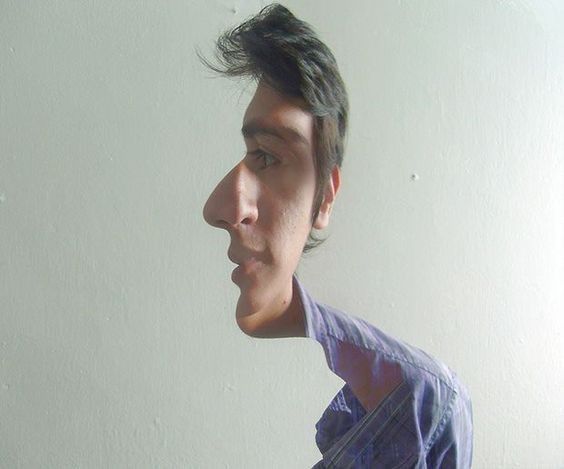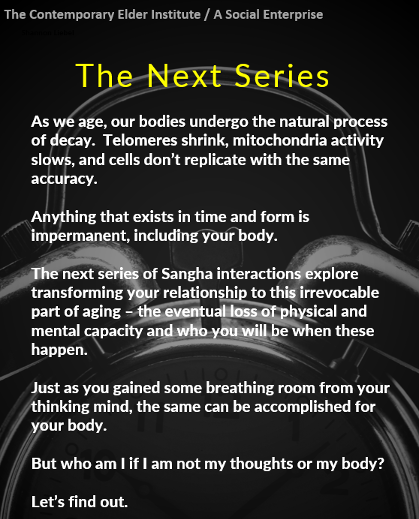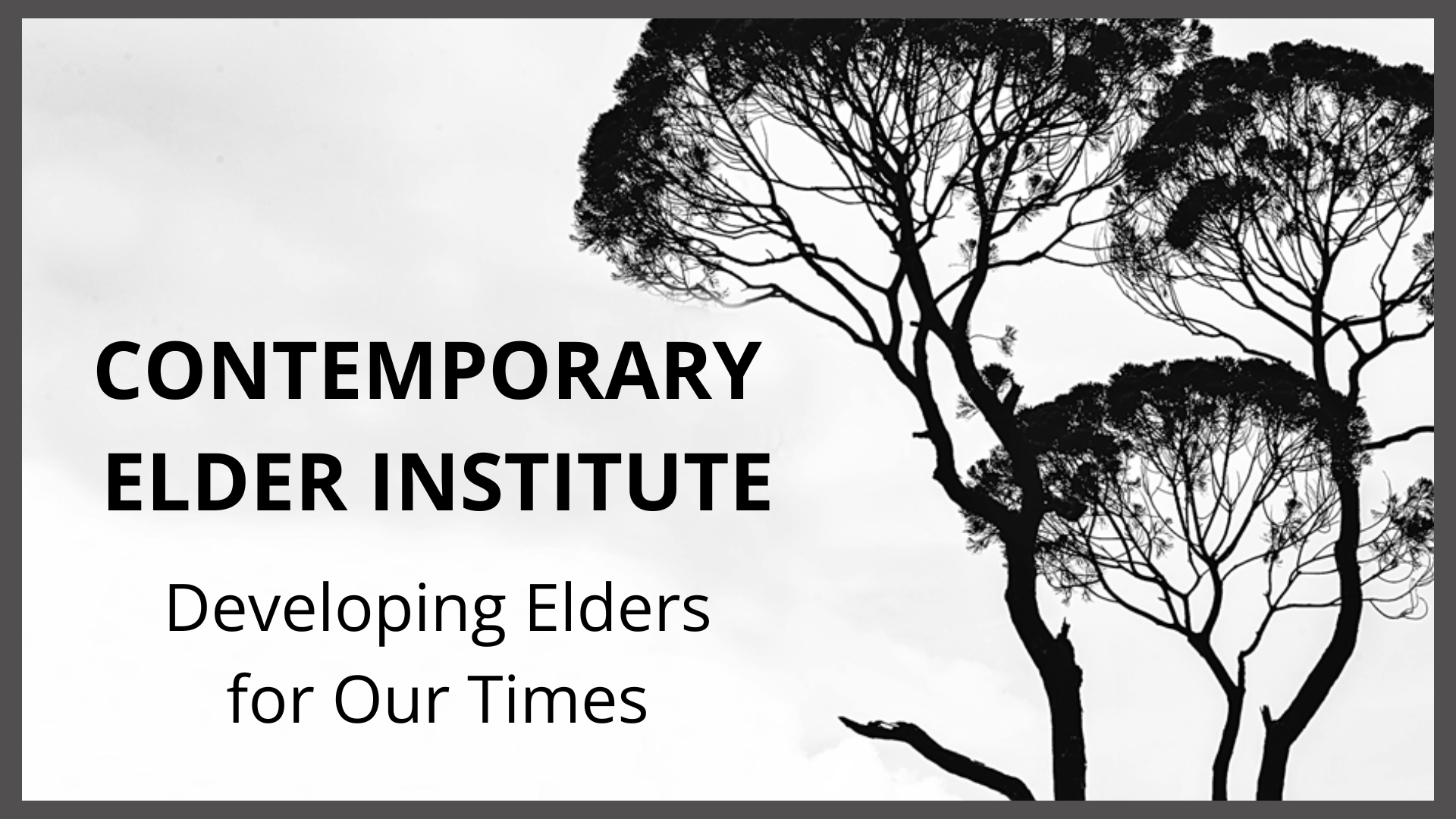ELDERS ARE SO WEIRD
ELDERS ARE SO WEIRD

The unspoken consensus is elders are weird. What is it about elders that have them considered weird?
Until this perception of being weird is understood and eventually transformed, it will remain a barrier to an elder's ability and credibility to bring forth higher wisdom. And the world could certainly use some higher wisdom.
The word weird was initially spelled "wyrd" and alluded to having a foot in both worlds, reality and spirituality, which allowed elders to have a unique capacity to hold these polarities together.
Over time, the meaning of weird shifted to encompass more general notions of destiny, fate, and magical and supernatural influences. However, weird took a left turn in Western culture. When spoken, weird portrays something or someone as strange, creepy, or unusual – in other words, weird.
People or things considered weird will not be invited to engage in conversations where relationship, family, group, or executive decisions occur - decisions that shape their future. And that's where elders must be to make the most significant difference.
THE DILEMMA
Elders can access other planes of reality beyond what the thinking mind can comprehend. Nearly all spiritual, philosophical, and metaphysical traditions contend the existence of these other planes of reality. And people in both the East and now many in the West have direct experiential knowledge of these other planes of reality.
These planes are different levels or dimensions of existence beyond the physical world that the thinking mind can perceive. Elders reach these other planes through meditation, yoga, self-reflection, contemplation, and some with psychedelics. And these planes of reality are as real as the reality you wake up into every day.
When the thinking mind encounters an elder who occupies these other planes of reality, planes the thinking mind cannot recognize, it leads directly to the interpretation that elders are weird.
Although incredibly powerful and essential for cognition, the thinking mind has some unexamined limitations and restrictions that keep hidden what's behind and beyond their thoughts.
Know the thinking mind for what it is, neither patron nor benefactor. The thinking mind is its own private institution. Becoming an elder whose abilities go beyond the thinking mind would be seen as weird.
THE THINKING MIND
The thinking mind is programmed to think "about" things. Thus, it has to turn everything into an object, including oneself. The mind automatically creates a duality when it thinks – him, her, them, or it over there, and me over here.
The thinking mind can't help itself. It can only do what it is designed to do: think "about" things. Since it can only think "about" things, the thinking mind has difficulty relating to awareness, faith, and the existence of the soul since none are things.
No wonder the thinking mind finds elders strange; since faith and the divine exists for elders, not as a caricature or concept. Given its design and function, is it any wonder the thinking mind would make God into a thing?
The thinking mind always comes with its locked-in prejudices and biases. The thinking mind believes it already knows. The thinking mind's job is to make itself right. And when it's wrong, it's right about being wrong. It's a closed-loop system.
The thinking mind is the judge and, most often, the jury, passing sentences on others and oneself. But elders learn to be the neutral party in the courtroom, not the judge, jury, prosecutor, or defendant. That is another reason the thinking mind finds elders a bit weird. Elders don't get involved in courtroom drama.
Although the mind thinks it has unlimited processing capacity, the thinking mind has a finite processing capacity. Koans in Zen Buddhism, a riddle that the thinking mind cannot solve, are used to interrupt the thinking mind and to see what's behind it.
In our work, we use two kinds of yoga, Hatha Yoga and Jnana yoga, to alter how people relate to their thinking minds. In both of these yogas, you can witness the mind in action. You get off the field and into the stands. You watch the thinking mind's offense and defense on the field. And after a while, you can call the plays before they happen. That is enlightenment.
The thinking mind pays little attention to the impact of emotions on what it thinks. But try thinking clearly when angry, afraid, upset, or heartbroken. Elders understand emotions are always there, exerting their influence – if they go unrecognized, they persist.
Elders let their emotions be present without being possessed by them or trying to suppress them. They have emotions; emotions do not have them. And elders get very nuanced about their emotions to gain greater awareness of them when they occur. They become the subject of their study on emotions. "Ah, here's that jealousy one again."
Elders do not need to process their emotions because they recognize their impermanent nature. Like waves on the ocean, they arise, crest, break, and make their sounds but soon disappear back into the ocean.
The ability to let emotions be, makes elders seem weird when they don't get upset, angry, defiant, or resistant. Not that elders lack emotion, they just don't become their emotions. Elders don't get sucked in.
Having survived their many troubles and tribulations, elders are not shocked or overwhelmed by today's crises and conflicts. Having repeatedly seen how things fall apart, elders have also witnessed the uncanny ways in which nature and humanity find roots of renewal.
An elder enhances renewal. The thinking mind has trouble understanding selfless intention: Selflessness and the mind, oil and water.
The thinking mind grasps and clings to keep its importance. As the Buddha stated in his noble truths, 1) Life is suffering. And 2) the cause of suffering is clinging and grasping to your thoughts.
Thoughts about the future. Thoughts about the past. Thoughts of fantasies. Thoughts of opportunities lost. Thoughts about mistakes made. An unending spool of thoughts. Nearly all of those 60,000 thoughts you have daily live in the past or the future.
An elder focuses on being in the present moment, which requires much more catch-and-release of thoughts. Minimize grasping and clinging, create greater freedom, and allow accessibility to higher wisdom. Thoughts become visitors, not permanent residents.
THE CONTEMPORARY ELDER CALLS FOR THE NEXT WEEKS

https://www.requestingwisdom.com/the-sangha
Upcoming Sangha Meetings:
If you would like to invite your friends to attend a guest call please have them register here: https://form.jotform.com/230334570253044
August 23rd - Open to guests
September 13th - Sangha Members only
September 27th - Open to guests
October 11th - Sangha members only
October 25th - Open to guests
November 8th - Sangha members only
November 22nd - open to guests
December 13th - Sangha Members only
December 27th - Open to guests
